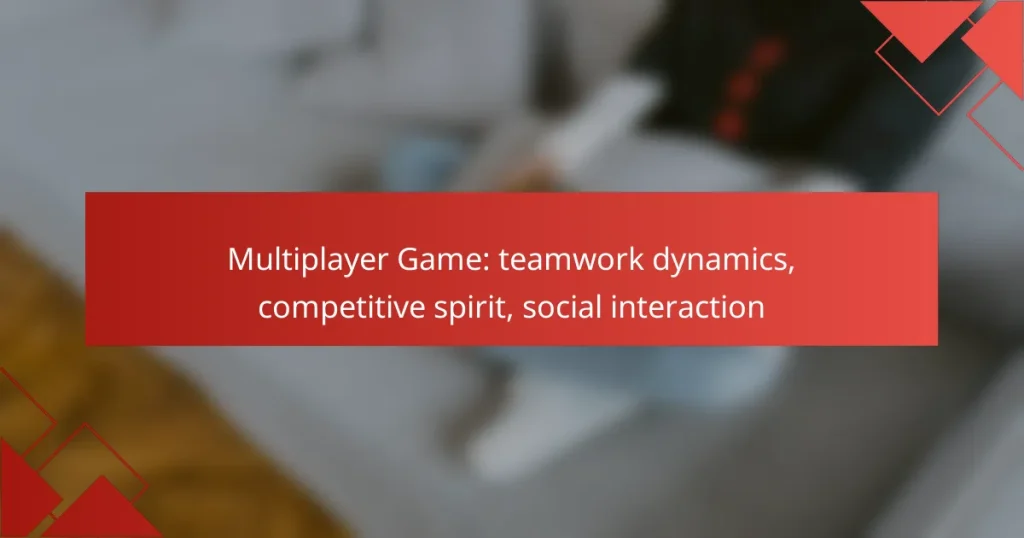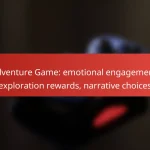Multiplayer games thrive on teamwork dynamics, where collaboration enhances player engagement and fosters stronger social bonds. The competitive spirit drives players to improve their skills and strive for higher rankings, creating a motivating environment. Additionally, social interaction within the gaming community cultivates connections that deepen commitment and enjoyment, making the gaming experience more fulfilling.
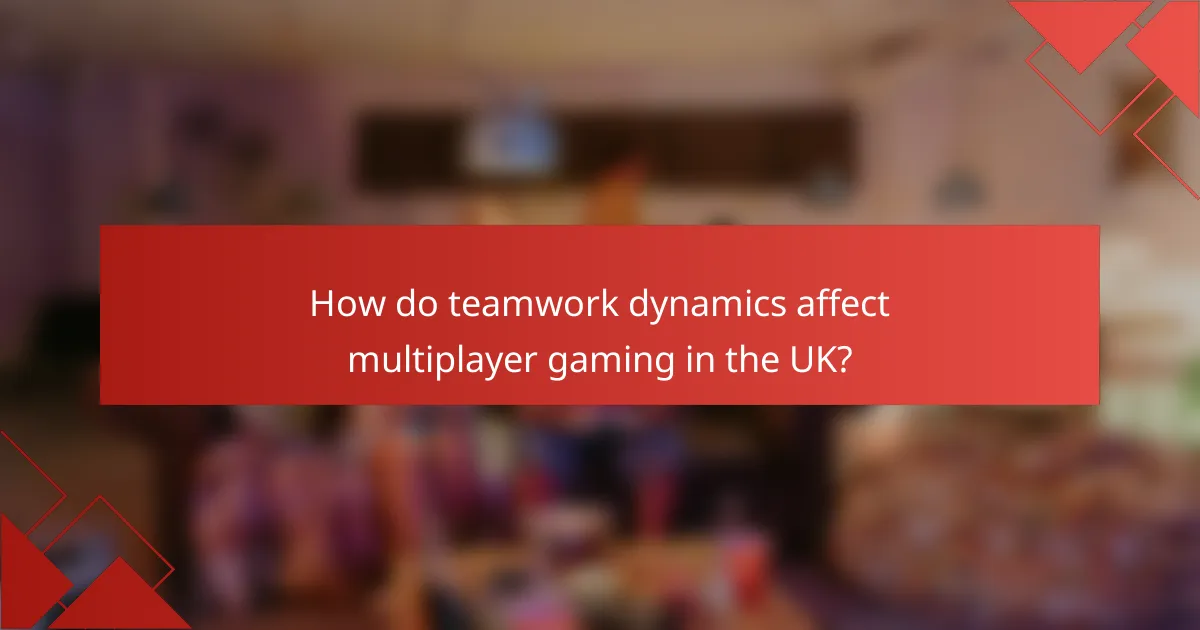
How do teamwork dynamics affect multiplayer gaming in the UK?
Teamwork dynamics significantly influence multiplayer gaming in the UK by enhancing player collaboration and engagement. Effective teamwork can lead to improved performance, stronger social bonds, and a more enjoyable gaming experience.
Enhanced communication
Effective communication is crucial in multiplayer games, as it allows players to share strategies, coordinate actions, and provide real-time feedback. In the UK gaming community, voice chat and messaging platforms are commonly used to facilitate this communication, enabling teams to respond quickly to in-game developments.
Players should focus on clear and concise messaging to avoid misunderstandings. Using specific terminology related to the game can help streamline discussions and enhance overall team performance.
Role specialization
Role specialization involves assigning specific tasks or functions to team members based on their strengths and preferences. In multiplayer games, this can lead to more efficient gameplay, as players can focus on what they do best, whether it’s attacking, defending, or supporting teammates.
For example, in a team-based shooter, one player might take on the role of a sniper, while another acts as a medic. This division of labor can significantly increase a team’s chances of success, particularly in competitive environments.
Conflict resolution strategies
Conflict can arise in multiplayer gaming due to differing opinions or play styles. Effective conflict resolution strategies are essential for maintaining team cohesion and performance. Players in the UK often benefit from establishing ground rules for communication and decision-making to minimize disputes.
Encouraging open discussions about issues and fostering a culture of respect can help teams navigate conflicts. Techniques such as taking breaks or involving a neutral party can also be effective in resolving disagreements and keeping the focus on teamwork.
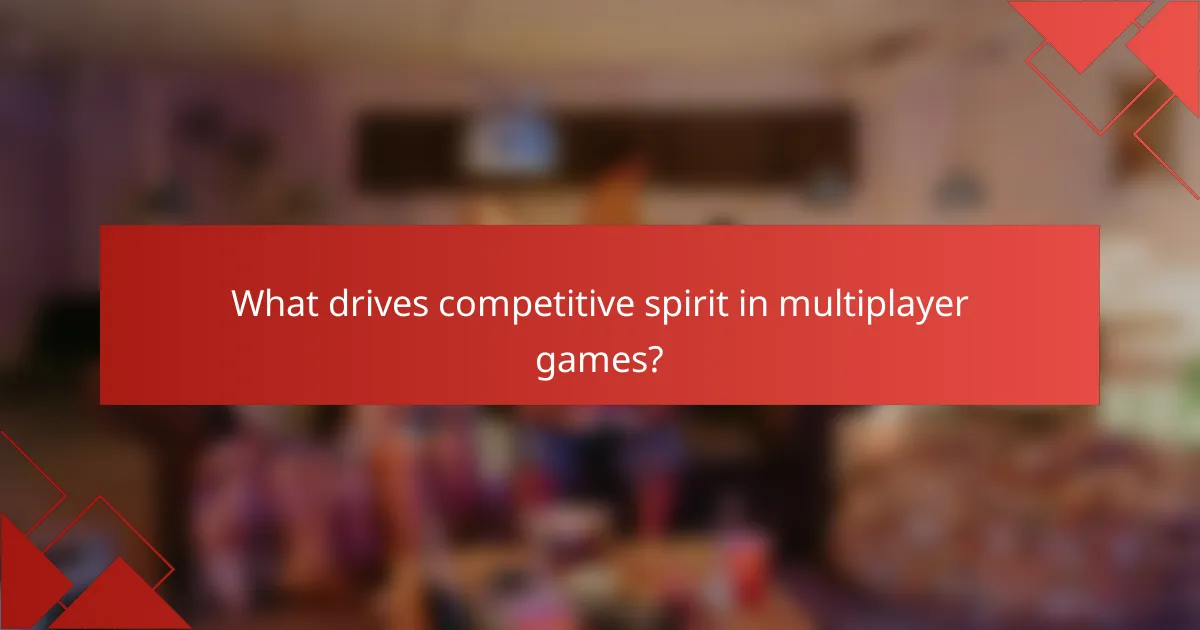
What drives competitive spirit in multiplayer games?
Competitive spirit in multiplayer games is primarily driven by the desire to achieve higher rankings, earn rewards, and engage in community events. These elements create an environment where players are motivated to improve their skills and outperform others, fostering both individual and team dynamics.
Ranking systems
Ranking systems are crucial in establishing a competitive framework within multiplayer games. They typically categorize players based on their performance, with tiers or leagues that reflect skill levels. For example, a player might start in a bronze tier and aim to reach platinum, which encourages ongoing improvement and engagement.
These systems often incorporate metrics like win-loss ratios, points, or experience levels. Players should be aware that climbing ranks can require consistent play and strategic teamwork, as individual performance is often evaluated in the context of team success.
In-game rewards
In-game rewards serve as tangible incentives that enhance the competitive spirit. These can include virtual currency, exclusive items, or character upgrades that are unlocked through achievements. Players are often motivated to compete for these rewards, which can significantly enhance their gaming experience.
Rewards can vary widely, from cosmetic items that showcase achievements to powerful gear that improves gameplay. Understanding the types of rewards available can help players set goals and strategize their approach to competitions.
Community events
Community events are organized competitions or challenges that bring players together, fostering social interaction and teamwork. These events often feature leaderboards, special rewards, and unique challenges that encourage participation from a wide range of players.
Engaging in community events can enhance the competitive spirit by providing opportunities for players to showcase their skills and collaborate with others. Players should look out for seasonal events or tournaments, as these can offer exclusive rewards and a chance to connect with fellow gamers.
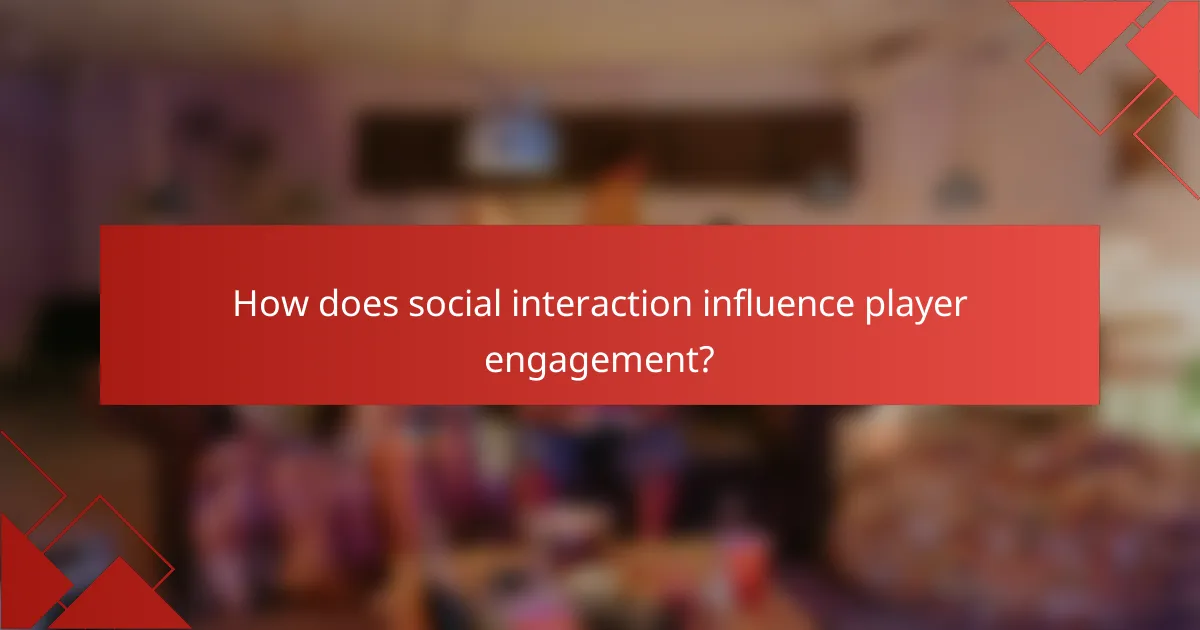
How does social interaction influence player engagement?
Social interaction significantly enhances player engagement by fostering connections and a sense of belonging within the gaming community. Players who interact with others are more likely to remain committed to the game, as these relationships can lead to increased enjoyment and motivation.
Friendship formation
Friendship formation in multiplayer games often occurs through shared experiences and teamwork. Players who collaborate to achieve common goals tend to develop bonds that extend beyond the game, enhancing their overall experience. These friendships can lead to regular play sessions, creating a more invested player base.
To facilitate friendship formation, games can implement features that encourage group activities, such as guilds or clans, where players can meet and engage with others who share similar interests.
In-game chat features
In-game chat features play a crucial role in facilitating communication and social interaction among players. Text and voice chat options allow players to strategize, share tips, and build camaraderie, which can significantly enhance the gaming experience. Effective communication can lead to better teamwork and a more cohesive group dynamic.
However, it’s important for developers to moderate chat features to prevent toxicity and ensure a positive environment. Implementing filters and reporting systems can help maintain a friendly atmosphere.
Team-building activities
Team-building activities within multiplayer games are designed to strengthen cooperation and enhance social bonds among players. These activities can include cooperative missions, challenges, or events that require players to work together to achieve objectives. Such experiences not only improve gameplay but also promote a sense of community.
Games can offer rewards for participation in team-building activities, incentivizing players to engage with each other. This approach can lead to increased player retention and a more vibrant gaming community.
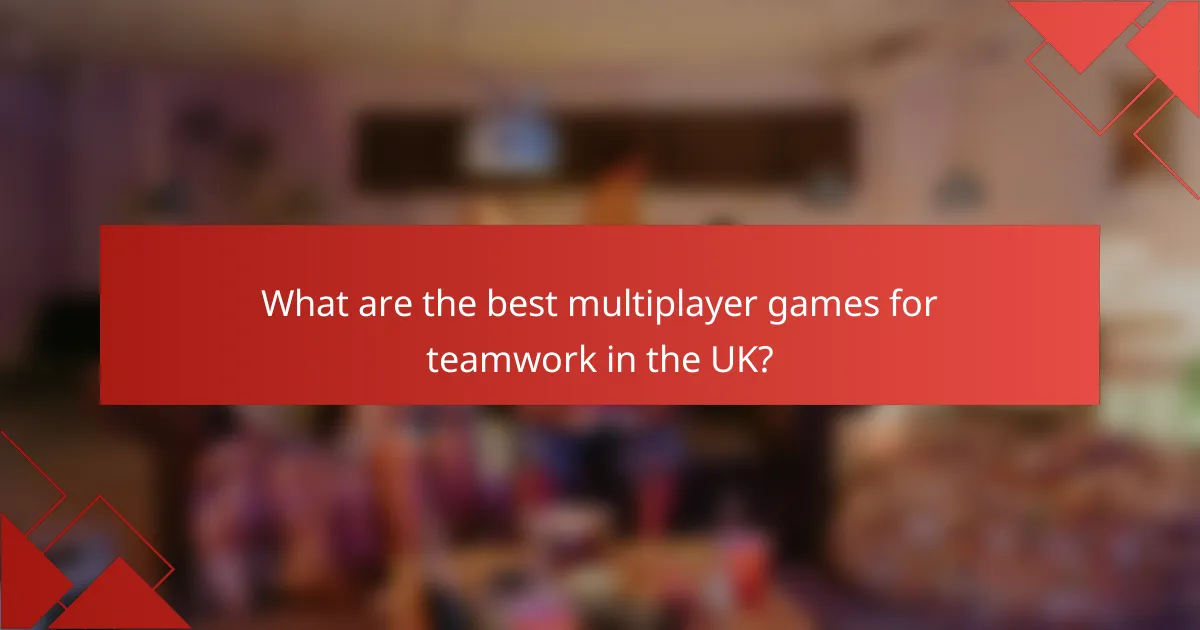
What are the best multiplayer games for teamwork in the UK?
Some of the best multiplayer games for teamwork in the UK include Overwatch, League of Legends, and Among Us. These games emphasize collaboration, strategic planning, and social interaction, making them ideal for players looking to enhance their teamwork skills.
Overwatch
Overwatch is a team-based first-person shooter that requires players to work together to achieve objectives. Each character, known as a hero, has unique abilities that complement one another, encouraging players to communicate and strategize effectively.
To succeed in Overwatch, players should focus on choosing heroes that balance offense, defense, and support roles. Effective teamwork often involves coordinating ultimates and positioning, so regular communication through voice chat or in-game signals is essential.
League of Legends
League of Legends is a multiplayer online battle arena (MOBA) game where two teams compete to destroy the opposing team’s Nexus. Success in League of Legends hinges on teamwork, as players must collaborate on strategies, lane assignments, and team fights.
Understanding the roles of each champion and their synergies can greatly enhance team performance. Players should avoid solo plays and instead focus on grouping for objectives like Dragon or Baron, which can turn the tide of the game.
Among Us
Among Us is a social deduction game where players work together on a spaceship while trying to identify impostors among them. The game thrives on communication and teamwork, as players must discuss suspicions and share information to uncover the impostors.
To excel in Among Us, players should engage in open discussions and pay attention to others’ behaviors. It’s crucial to balance teamwork with caution, as trust can be easily manipulated by the impostors, leading to unexpected betrayals.
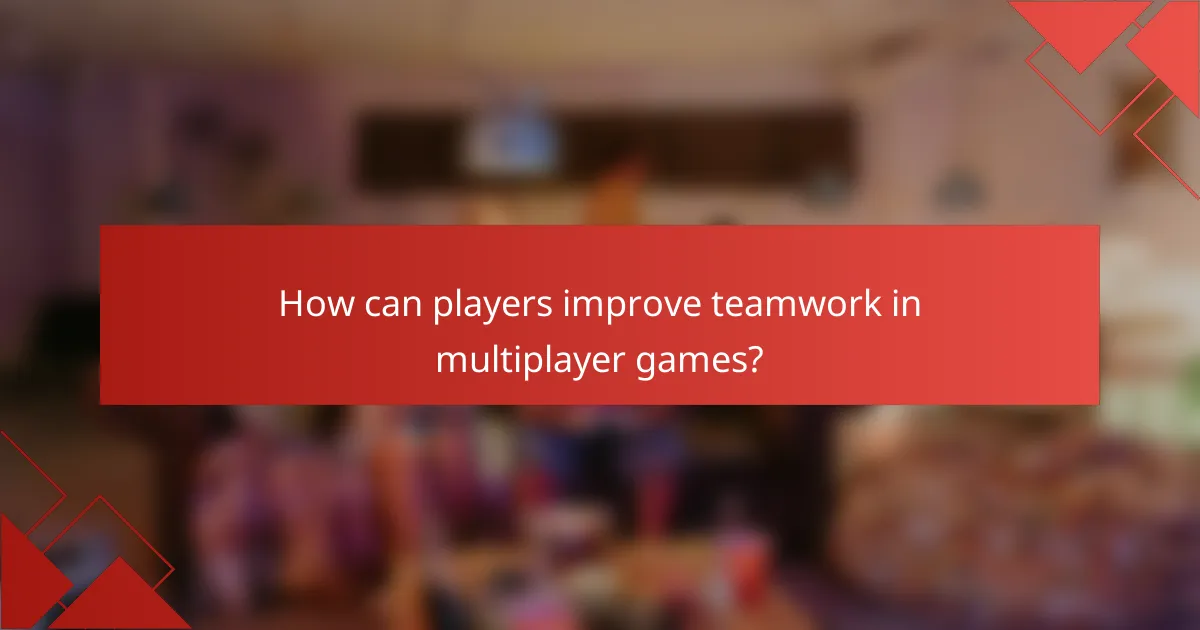
How can players improve teamwork in multiplayer games?
Players can enhance teamwork in multiplayer games by focusing on effective communication, participating in team training, and utilizing strategy guides. These practices foster collaboration, build trust, and improve overall performance in competitive environments.
Practice communication skills
Effective communication is crucial for successful teamwork in multiplayer games. Players should practice clear and concise messaging, using voice chat or text to relay important information quickly. Establishing a common language or shorthand can also streamline communication during intense gameplay.
Active listening is equally important; players should pay attention to teammates’ calls and respond appropriately. Miscommunication can lead to mistakes, so confirming understanding before executing strategies is vital.
Participate in team training sessions
Team training sessions allow players to build synergy and refine their skills together. Regular practice can help team members understand each other’s playstyles and develop coordinated strategies. Scheduling these sessions weekly can lead to significant improvements in teamwork.
During training, teams should focus on specific roles and responsibilities, ensuring that each player knows their part in various scenarios. This preparation can enhance performance during competitive matches.
Utilize strategy guides
Strategy guides can provide valuable insights into game mechanics and effective tactics. Players should seek out reputable guides that cover their specific game, focusing on team strategies and character synergies. Utilizing these resources can help teams understand optimal approaches to challenges.
In addition to guides, watching professional gameplay can offer practical examples of teamwork in action. Analyzing how top players communicate and collaborate can inspire teams to adopt similar strategies in their own gameplay.
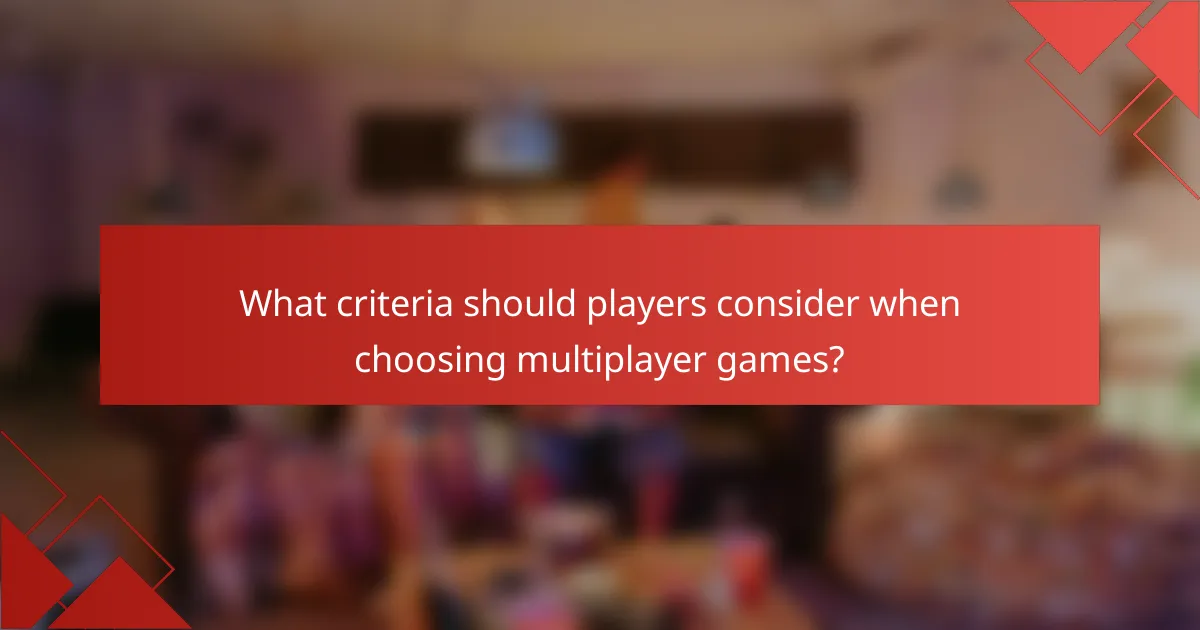
What criteria should players consider when choosing multiplayer games?
Players should consider game mechanics, community engagement, and competitive balance when selecting multiplayer games. These factors significantly influence the overall experience, teamwork dynamics, and social interactions within the game.
Game mechanics
Game mechanics refer to the rules and systems that govern gameplay. They determine how players interact with the game and each other, influencing teamwork dynamics and competitive spirit. For instance, cooperative mechanics may foster collaboration, while competitive mechanics can enhance rivalry.
When evaluating game mechanics, consider aspects such as the complexity of controls, the learning curve, and the variety of gameplay modes. Games with intuitive controls and diverse modes can accommodate both casual and hardcore players, enhancing social interaction.
Additionally, look for games that offer balanced mechanics to ensure fair competition. Games that frequently update their mechanics or introduce new content can keep the community engaged and maintain a healthy competitive environment.
